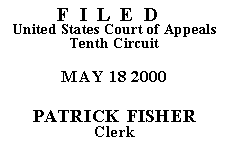

| DAVID J. CROSBY,
Petitioner-Appellant,
v.
GARY NEET, Warden; THE
ATTORNEY GENERAL OF THE
STATE OF COLORADO Respondents-Appellees. |
No. 00-1020
(D.C. No. 99-Z-1994) (Colorado) |
David J. Crosby, a state prisoner appearing pro se, appeals the denial of his petition for habeas corpus relief and seeks a certificate of appealability. Mr. Crosby was convicted in Colorado and began serving his sentence there. He was later transferred to two prisons in Texas before his transfer back to a state correctional facility in Colorado. He filed a petition for habeas corpus relief under 28 U.S.C. §§ 1651, 2241, 2243, and 2254, claiming that his transfer to Texas violated his constitutional right to due process and that the State of Colorado lost jurisdiction over him as a result of the transfer. The district court denied his claims and his request for a certificate of appealability. In order to obtain a certificate of appealability from this court, Mr. Crosby must make "a substantial showing of the denial of a constitutional right." 28 U.S.C. § 2253(c)(2).
The gist of Mr. Crosby's argument is his assertion that the transfers were in violation of state law and that as a result he was denied his constitutional right to due process. This court recently considered and rejected the claim that a transfer such as the one challenged here violates a prisoner's constitutional rights. See Montez v. McKinna, 208 F.3d 862 (10th Cir. 2000). We pointed out there that the transfer of an inmate from one state to another violates neither Colorado nor federal law. Id. at 865-66. We further noted that an inmate has no constitutionally protected right to serve his sentence at any particular prison. Id. Because Mr. Crosby thus has no constitutional interest entitled to due process protection, his due process claim is without merit.(1)
Mr. Crosby also contends the state of Colorado lost jurisdiction over him by the transfers. To the extent this claim is based on the Constitution, it is without merit. See Blango v. Thornburgh, 942 F.2d 1487, 1490 (10th Cir. 1991) ("Criminal jurisdiction over a state's inhabitants remains with the respective states and territories under whose jurisdiction the prisoners were originally sentenced.").
Finally, Mr. Crosby contends the district court erred in denying relief without holding an evidentiary hearing. Because the issues raised are purely legal ones that can be resolved on the basis of Mr. Crosby's petition, the district court was not required to have an evidentiary hearing. See United States v. Tubwell, 37 F.3d 175, 179 (5th Cir. 1994); 28 U.S.C. § 2243.
We DENY Mr. Crosby's request for a certificate of appealabilty and DISMISS this appeal.
ENTERED FOR THE COURT
Stephanie K. Seymour
Chief Judge
*.This order and judgment is not binding precedent, except under the doctrines of law of the case, res judicata, or collateral estoppel. The court generally disfavors the citation of orders and judgments; nevertheless, an order and judgment may be cited under the terms and conditions of 10th Cir. R. 36.3.
1. On appeal, Mr. Crosby appears to recognize that a procedural due process claim requires a constitutionally cognizable liberty interest and characterizes his claim as one based on substantive due process in an attempt to overcome this deficiency. The allegations in support of his claim, however, reveal that it is the allegedly improper transfer procedures for which he seeks a remedy. Moreover, any due process claim, either substantive or procedural, is by the very language of the Fourteenth Amendment and the authority cited by Mr. Crosby dependent upon the existence of an underlying constitutionally recognized interest that is simply not present under the circumstances here.